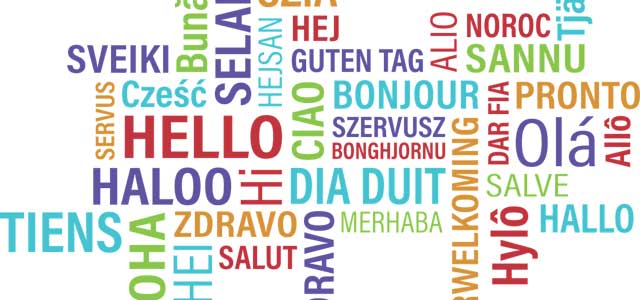It’s a fact of Western life that most people speak some English. Even though globally more people speak Mandarin; English is used more often in Business, Education and online across the world.
This makes people who speak English as their native language a little lazy at times but it also means there are literally millions of people who speak a little bit of English and who are trying to learn more.
The popularity of online English tuition sites like www.perfectlyspoken.com only serve to highlight this. But just because everyone speak English does this mean we should all ignore other languages?
Perhaps the drive to learn French or German may have ebbed a little but being able to greet someone in their language can go a long way to building better relationships.
Business
There’s no doubt that when engaging in any kind of negotiation with non English speaking people, being able to properly greet them in their own language is a very good start.
It shows respect and in many cultures can make all the difference. Even though evidence suggests English is the most widely used language in business it’s useful to know how to greet others.
Social
Even if there’s no deal on the table it’s really nice to be able to great new friends and people we meet in daily life correctly. A little bit of effort can go a long way and it can also go towards highlighting a greater feeling of solidarity and multiculturalism.
There are a wide range of resources online to help anyone learn the basics of a language and certainly enough to master greetings.
Arabic
To great someone correctly from any Islamic or Arabic background it’s polite to either say
“As-Salaam-Alaikum,” which means “Peace be unto you” or if this is said to you reply with “Wa-Alaikum-Salaam” which means “and unto you peace”.
I many cases the person may feel they should not use a traditional greeting so it’s nice to be able to offer the initial greeting here and wait for the response.
Japanese
In Japan the bow is also including in the greeting. A 15 degree angle bow is considered informal whereas a 30 degree bow is used for formal meetings. Even if people are in a group it’s polite to greet each person individually.
If the meeting is in the morning say – Ohayo gozaimasu
If the meeting is later in the day then say – Konnichiwa
If the meeting is in the evening then use – Oyasumi nasai
French
There are two important physical aspects to greeting people in France. If people are not friends then a hand shake is appropriate but if you’ve met before then a single kiss on each cheek is polite for both men and women.
In some parts of the country 4 kisses are expected but 2 will suffice in all areas.
Verbally a simple “Bonjour” during the day and “Bonsoir” in the evening is all that is needed.
Indian
An important thing to remember in India is that not all handshakes are firm. If a visitor offers and handshake it’s considered respectful for the other person to offer a less firm shake.
Traditional greeting involves saying “Namaste”, which means “I bow to the divine in you”. This should be paired with a gesture of bringing the hands together with palms touching in front of the chest in a graceful way. This shows a great deal of respect and is the perfect way to greet a new person in business or socially.
Italian
Italy is a country famous for being friendly and expressing these feeling openly. However, they do also expect a respectful greeting in business situations and more formal occasions.
A hand shake coupled with the words “Buon giorno” during the day or “Buona sera” in the evening. It’s also critical that each person in a group is greeted as a separate individual. It’s considered rude to only greet one and then just say hello to the others.
South Korean
In South Korea the traditional greeting involves a bow. However, this is often done with a handshake among men. It’s important to remember to support the right forearm with the left hand during this handshake to show respect.
Women usual nod slightly and don’t shake hands with Western men at all.
A common greeting verbally is “An-nyeong-haseyo” this can be used in most situations.







